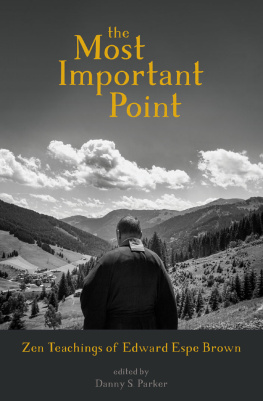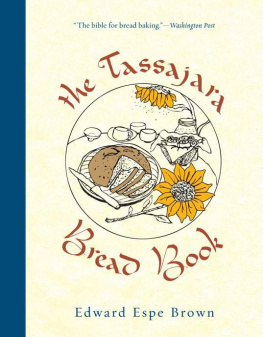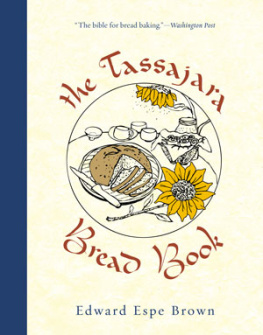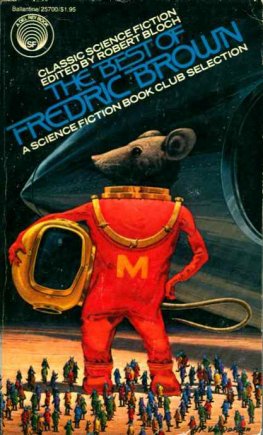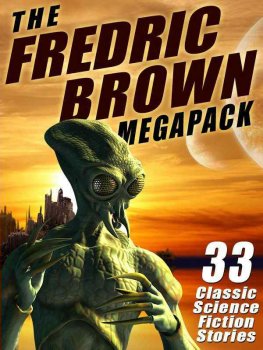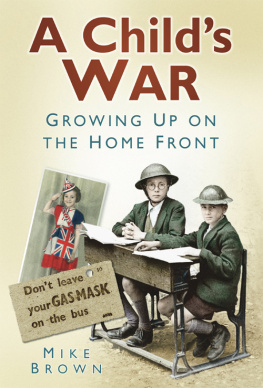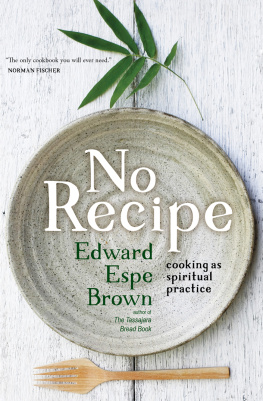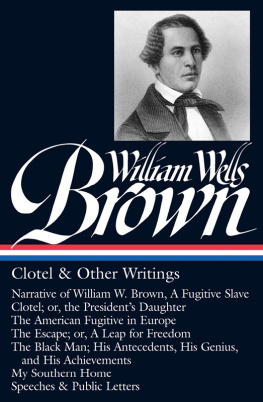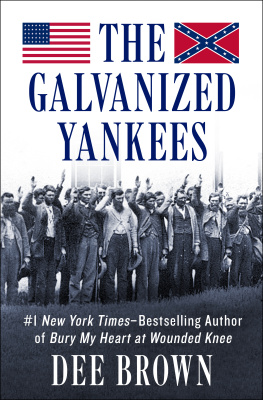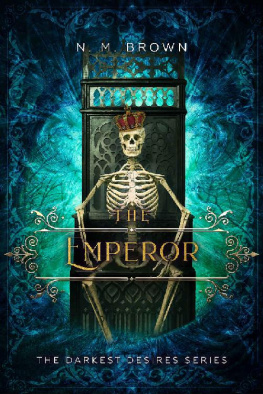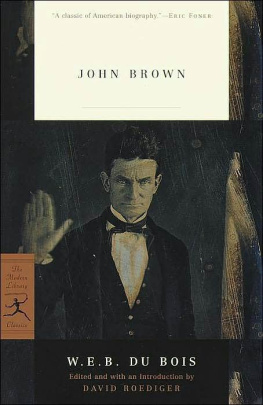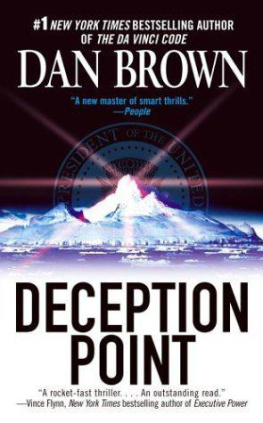Acknowledgments
Edward Espe Brown has been teaching and speaking about Zen practice and spiritual liberation for more than forty years. Thus, the body of work to be reviewed was extensive.
Many individuals and institutions provided recordings that made up the mountain of available material. They include the San Francisco Zen Center and its affiliated centers, Green Gulch Farm Zen Center and Tassajara Zen Mountain Center. Thanks also to Spirit Rock Meditation Center for permission to use talks from this location, as well as others from the Sacramento Buddhist Meditation Group, Chapel Hill Zen Center, and Puregg Haus der Stille in Austria.
Within this process, I very much appreciate Charlie Wilsons very professional conversion of the many cassette tapes, CDs, and even reel-to-reel recordings to an MP3 format. These were instrumental to our progress. Indeed, Charlies effort made our book possible.
This work has evolved through an effort by many individuals over the last four years. First and foremost, as editor, I appreciate the vital help from Sally Harris Sange, who transcribed over ninety of the approximately three hundred and fifty talks spanning twenty-five years, which we selected after an extensive review. These were then cooked down again. Beyond the painstaking work associated with transcription, Sally also helped me with editing and selecting the final material, as well as sharing comments and suggestions for the draft manuscript. She knows how instrumental she was to the results. My deepest thanks and gratitude.
These talks were often heavily edited for length and substance and then organized into topics for the book. Those wishing to examine the original lectures are encouraged to do so. It should be noted that, as with many speakers, Ed Brown often evokes obvious emotion, humor, and deep feeling in the spoken word that is difficult to capture here. We plan to establish a web link to a number of the talks for those who have that interest (peacefulseasangha.com/audio/audio.htm).
I appreciate input and recollections from David Chadwick (cuke.com), filmmaker Doris Drrie, and Mathias Khl at the Buddhistches Zentrum Scheibbs. I further wish to thank others for helpful review or suggestions for the material: Valorie Beer, Colleen Morton Busch, Anne Hinckle, and Marjorie Walter. Clare Hollander provided very helpful notes taken on many of Eds talks, which were otherwise unrecorded, and my friend Helene Zindarsian shared photographs. Margot Koch helped me to sort through stacks of pictures, diaries, and years of detailed notebooks. Thomas Radlwimmer (www.radlwimmer.at/) contributed the stunning photograph that graces the books cover.
Many thanks also to my agent Katherine Fausset at Curtis Brown, who has unfailingly represented me with deft ability over the years. At Sounds True, appreciation for the patient assistance of Caroline Pincus to help produce a memorable and handsome work. We also appreciate the skill of editors Jade Lascelles and Vesela Simic in the production process.
I also thank my dear friend John Busch, who has helped me in ways difficult to tell: mysterious synchronicity. His friendship and encouragement have meant so much over the years.
Finally, my appreciation to Edward Espe Brown himself, to whom I owe special gratitude for his teachings and his trust. Thank you.
May the merit of our collective effort extend everywhere.
DSP
Afterword
To the extent
I am aware that I am in the middle of some things,
Chewing, stewing, moving along, I have resources
More than ever I am aware that I am flying freely
Connected to the core of the earth
And yet, receiving high heaven
One with the vastness, loved and loving...
Yet, time is short
Life passes in a flash
A few moments and a couple of days ago,
I was working in the Tassajara kitchen above the pit.
You know, that kitchen?
A few moments from now,
you will be doing my memorial service.
And a few moments later Suzuki Roshi
will walk in the door...
Also by Edward Espe Brown
The Tassajara Bread Book
Tassajara Cooking
The Tassajara Recipe Book
Tomato Blessings and Radish Teachings
The Complete Tassajara Cookbook
Not Always So
No Recipe
About the Author and the Editor
Edward Espe Brown is a St Zen priest in the lineage of the legendary teacher Shunryu Suzuki (Zen Mind, Beginners Mind). In 1971, Suzuki ordained Edward, giving him the name Jusan Kainei, meaning Longevity Mountain, Peaceful Sea.
Widely known in the United States and Europe for his meditation and cooking classes, Edward is the author of several books, among them The Tassajara Bread Book, published in 1970, an international phenomenon that inspired a generation to bake and cook. He has taught Zen practice for more than forty years, utilizing yoga sessions and more recently qi gong classes for students to have a fuller flow of energy and vitality.
In 2007, Doris Drrie made a feature-length film about Edward called How to Cook Your Life. Sounds True published his most recent book, No Recipe, in May 2018.
Danny Parker is a longtime student of Edwards and was ordained by him in 2011 and given the Buddhist name Shj Reigen (Deep Listening, Sacred Ground). Dannys day job is to study residential energy efficiencyhow to reach zero energy houses. Along with this work and raising a family, he has completed several books about the Second World War, including most recently Hitlers Warriora character study of how racial intolerance and war can be tragically embraced by society. Edward attests that Danny is an unusual sweetheart of a person and a joy for people to be around.
Wild West Tassajara
I first came to Tassajara the summer of 1966. My friend Alan Winter had gone on a Zen Center ski tripI think it was the last Zen Center ski tripin the spring of 1966 and met someone named Richard Baker. Richard told Alan that Zen Center was thinking about buying some land down here at Tassajara. Zen Center had about $1000 in the bank. He told my friend there was this place called Tassajara and Why dont you get a job there? So Alan got a job at Tassajara as a handyman. He told me I could probably get a job in the kitchen, which I did.
The kitchen was where the pit is now. It was a pretty nice kitchen, with an open-air tower at the top so a breeze could come through. Todays student eating area was the bar. For many years, Tassajara was a destination drinking spot. Youd drive the fourteen-mile dirt road, get a drink, and go to the hot tubs. Those were the days. The Tassajara dining room was where the kitchen is now. Bob and Anna Beck, the owners of Tassajara at the time, lived where the dining room is now; previously it had been divided into rooms.
As always it was hot in the summer. When you worked in the kitchen, you could order a Carta Blanca or a Dos Equis from the bar. Some cooks would have a gin and tonic with a twist of lime. If you were a cook, you wanted to stay cool and in good humor. Maybe it helped take the edge off.
Once our nearest neighbor drove the fourteen-mile dirt road all the way down into Tassajara. To get our attention, he drove his VW bug in a big circle in the parking lot, spinning his wheels and firing off his gun into the air.
I went out to check on the commotion. Hey, Bill, can I get something for you? I asked.
Im thirsty.
I offered him some Carta Blanca beer.
Beer? Got any whiskey?
After Id brought out some glasses and a bottle labeled whiskey, he spit it out. This isnt whiskey, he said, its Scotch.
That being corrected soon enough, after a drink or two, he was on his way.
I had a job washing dishes and scrubbing pots. Jimmie and Ray were making beautiful bread, so I asked, Will you teach me?
Next page
